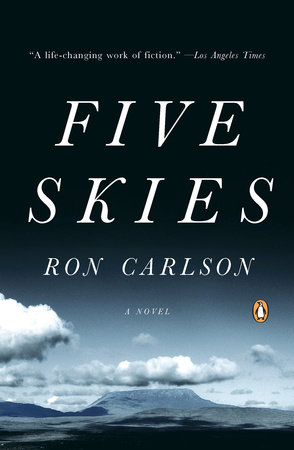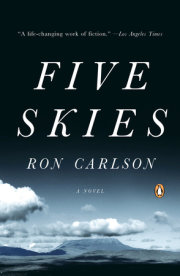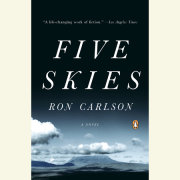The first time Arthur Key saw the plateau at the far edge of the ranch called Rio Difficulto, he was lying in a sleeping bag in the frigid open air at dawn, or a little before it, in the deep gray light through which so many creatures jostled in the sage. He was a big man and had slept in rough sections, shouldering the oversize Coleman sleeping bag up over his right arm and then his left by turns. A screaming rabbit had woken him, the cries thin and shrill in their extremity sounding only like a woman to him, only like a crime. They beat into the fading darkness like a two-note whistle, then suddenly stopped, and Arthur Key lifted his head and scanned the area. At first he didn't know where he was, which rooming house, but he knew the low black line of the crenellated mountain horizon was a hundred miles distant. The large Ford flatbed—still loaded—was parked off in the sage, cocked unevenly because of their having let so much air out of the tires the night before. Beside it he could see a small open army surplus jeep with a winch on the front bumper, and behind that a pile of material, a stack of large lumber in stays, the small tractor, a blue portable john still in its rough wooden crate, the frost on everything silver in the new light. There was nothing else, no building, no tent, no small trailer across the work yard. He closed his eyes and smiled. Darwin had said room and board.
Arthur Key put his hand on his head and felt the frost in his hair. In the new silence, he could now hear another sound which at first he assumed to be some pressure in his head. Then as he yawned and cleared his ears he guessed it was the flat high harmonics of an intercontinental flight, San Francisco to Boston, but as the vibration persisted he sat up and listened again. There were fluctuations in it like those in human speech, and a rhythm as if a generator were running somewhere a half-mile away. He wanted it to be a generator, the gas-driven generator that would be running the galley trailer where coffee would be ready, hot coffee and absolutely anything else.
In the past six weeks, mornings had been kindest to him. He had saved himself for two things: waking and having some coffee, and then, of course, the day caught up with him and he put his head down and worked, whatever it was. He'd just finished two weeks in Pocatello working cement on the foundations for new storage units. He told himself he was trying to regroup, to get a grip, but he now knew, after this time away from the life he had ruined, he wasn't doing a very good job of it.
The sound wasn't a generator and it wasn't people talking. When he stood, he knew it was at some distance a river, and as he walked toward it and saw clearly the mortifying fissure through which such a vast river ran, the geology of the entire plateau settled in his mind as an entity, a huge primitive place that few men had seen. He went to the edge of the sandstone gorge and looked down. In the deep gloom he could see the electric white gashes where the water boiled over the boulders. Here the sound was terrific, magnified, real. It sucked the air away and drew you toward it. Key measured up the river, estimating the vertical canyon at fifteen hundred feet. He couldn't sense the width. Below him as his dizziness abated he saw a shadow sweep and then an osprey rose into his face, a small cutthroat trout in one talon. Across the chasm the first sunlight clipped the western echelon of ruined mountains and cones of the badland volcanoes at the edge of the world, and they were gray and red and gold in the moment. Two low spires of smoke smudged the sky far away; it would be early in the year for such fires.
Key heard a sharp painful sigh and turned to see a figure moving on the ranch road, a thin man whose shadow in the new sun cut a hundred yards toward the canyon. It was the kid, Ronnie. He was walking away in the barren place and then Arthur Key saw the man begin to run in the cold, a stride purposeful and beautiful at once. Key folded his arms and watched until the shadow streamed slowly south and disappeared.
Darwin, still in his sleeping bag, had watched the young man move to the gate and run away. He'd already seen the big man, Arthur, move to the canyon edge. The sun was up now, but it was not warmer, and the frost filled every shadow and coated the glass of the two vehicles. He crawled out of his sleeping bag and laced up his boots and put on his jacket. He was unfolding the metal stove table and opening the stove when the big man, Arthur Key, came back from his tour.
"Where'd Ronnie go?"
Darwin was a little sick now that he realized he'd made a mistake by hiring these two. He'd been desperate—it had been late in the day and the country was full of men who couldn't work, wouldn't work, and they were hard to get rid of. Just driving back to Pocatello would cost him more than a day. He'd been tired and he was fooled by the big man's size, he knew now. Darwin lit the propane and set the coffeepot on the burner while he pulled the heavy cast-iron frying pan from the cookbox. In forty years at the ranch he'd hired maybe six bad apples, and now for the first time on his own he'd started with an error.
Copyright © 2008 by Ron Carlson. All rights reserved. No part of this excerpt may be reproduced or reprinted without permission in writing from the publisher.









